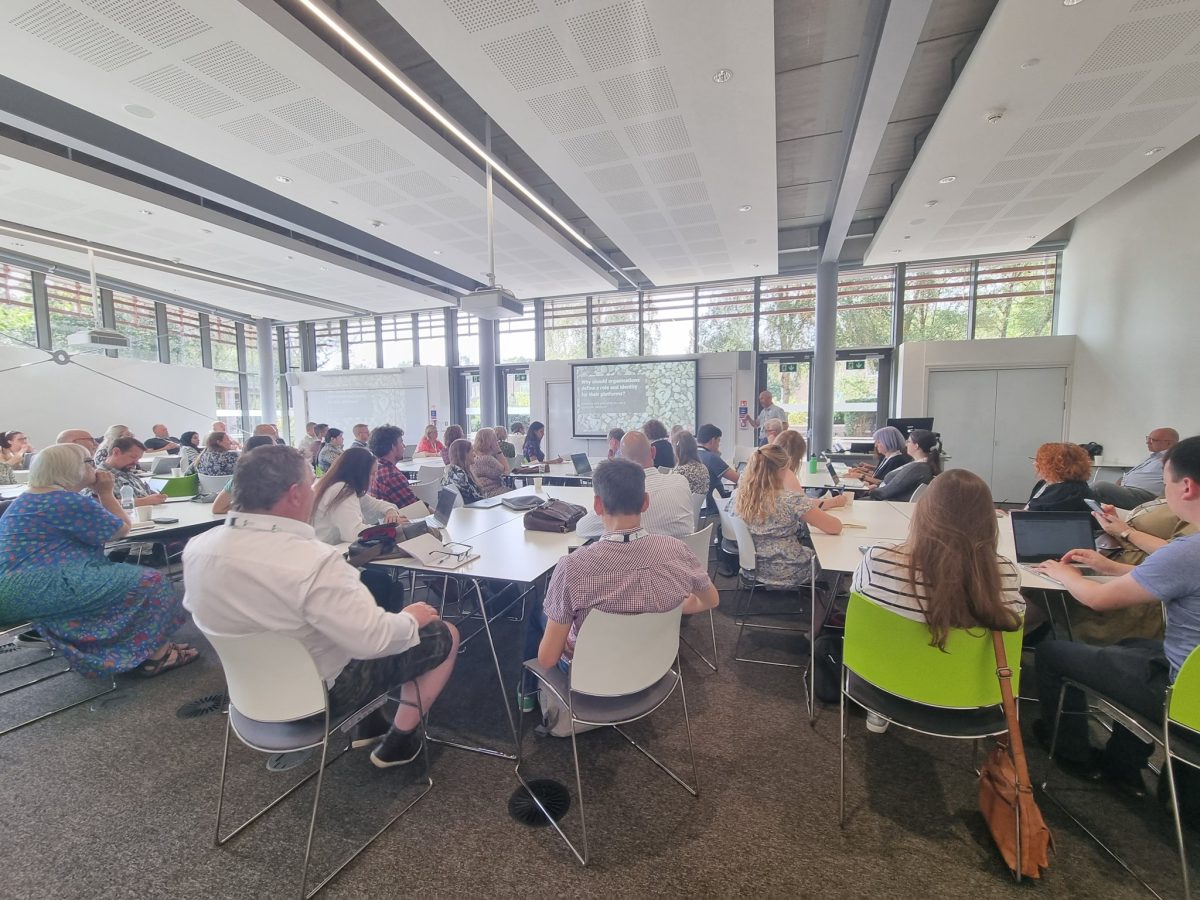[Featured image by kind permission of co-chair Santanu Vasant]
Given I’ve been working in this field since 2010, it’s perhaps surprising that ALTC23 was my first ALT conference! I didn’t have anything to present so this was a great opportunity to further my CPD and I’d like to thank co-chair Lawrie Phipps and the committee for enabling that to happen.
Trying to summarise a 3-day conference as busy as ALTC23 is hard-to-impossible so I’m going to share some of the things that haven’t stopped rattling round my head since the conference.
“Things cannot be made simple” Anne-Marie Scott Keynote
Anne-Marie Scott delivered a powerful keynote that I highly recommend you take time out to watch.
There’s much to reflect on there but my mind was racing throughout it about the tension between living in a complex world and our desire for simplicity. She makes an early reference to storytelling which is worth digging into.
The role of a story is to render the complex simple. Will Storr’s Science of Storytelling is a good source on this. Life is infinitely complex but our brains are capable of dealing with limited information so we become selective about what we pay attention to. This process is instinctive and unconscious most of the time.
So, there’s a real conflict going on. We need to understand the world as a complicated thing, especially if we are leaders or responsible for learners, but the gravity of story pulls us naturally towards simplicity unless we expend energy to “maintain orbit”.
It was interesting then that Satwinder Samra’s day 3 keynote touched on related themes as he talked about the need to engage people through communication.
His plea, aimed at people in specialised fields was to avoid using needlessly complex language when communicating with people outside your profession.
I don’t think there’s a contradiction with Anne-Marie here. Storytelling can be an effective way to unlock complex ideas. So long as we use them as “hooks” to grab attention to important things rather then distracting people with seductively easy answers, we’re on safe ground.
Using data to improve the student experience
The flip side of the “understanding the world” coin from story and narrative is the objective and empirical. I’m a bit of a tourist when it comes to the world of data, but an enthusiastic one. So, I made time to go to sessions that were looking at data and analytics.
There is a wealth of data floating around that just isn’t being used to inform decision-making or course design to its full potential. Any interaction with a platform generates a data point, after all.
I heard Colin Loughlin talking about his work at Brunel University with statistician Ben Parker digging into the data to investigate the relationship between VLE engagement and academic outcomes, establishing complex patterns that don’t play nicely with a line of best fit.
And I heard a fascinating take on how to extract insights from Echo360 lecture capture viewing data using the programming language R by Emily Nordmann and James Bartlett from the University of Glasgow.
Data is an underutilised resource, but there were 2 important considerations for me:
- This work is hard. The labour takes time and requires expertise that not all teachers will want to invest in uncovering where the data actually is, never mind what it actually signifies. One participant talked about a “gold mine” of data and how we could be gold miners, reaping the potential rewards. I began to picture a lot of people saying the equivalent of “but I’m not a miner; I’m a farmer”. How then to maximise this untapped resource without contributing to a “data burden” that as Andy Youell recently wrote in WonkHE is keenly felt at an organisational level. I will however, be spending a lot of time looking at Emily’s development resources on PsyTeachR to build my own skills!
- Sometimes, you can only push the data so far. A data point is just a data point which can only tell a simple story. Multiple data points shows you valid and interesting patterns but particularly with Colin’s presentation I found myself thinking that it would be easy to imbue the data points of who spent most time access the VLE with more meaning than we should be confident in. Colin addressed this himself. There occasionally comes a point where the data helps us to know what questions to ask, what hypotheses to test, but then we have to go into the qualitative realm and find out what people are experiencing on in individual level if we want to be sure that any actions we take will have the desired effect.
The role of imagination and creativity
A session that got me particularly energised was Timothy Drysdale’s presentation of his team’s work developing remote engineering laboratories at the University of Edinburgh.
It wasn’t just the technical solution to a problem that he told us about but the creative design elements that had been incorporated. Placing the boxes in public spaces rather than tucked away tidily in a lab is a neat idea to spark curiosity and engagement, and I loved the cheeky use of vinyl coverings to simulate the look of shipping containers.
It was pleasing to see this work recognised with the Jisc-sponsored ALT award for digital transformation.
And I’ve an additional shoutout for a presentation on similar theme of remote laboratories at Loughborough University by Prof Sheryl Williams, Ben Clark and Alford Chauraya which showed similar levels of innovation and deserved a bigger audience than it got on the day.
AI Fatigue
A final point that there was plenty of engagement with AI-related topics in the programme and you can read more of Jisc’s reflections about this in Sue Attewell’s post. But there was also a tangible feeling of AI exhaustion and a hope articulated in some audience interaction that next year might see less change in this area.

